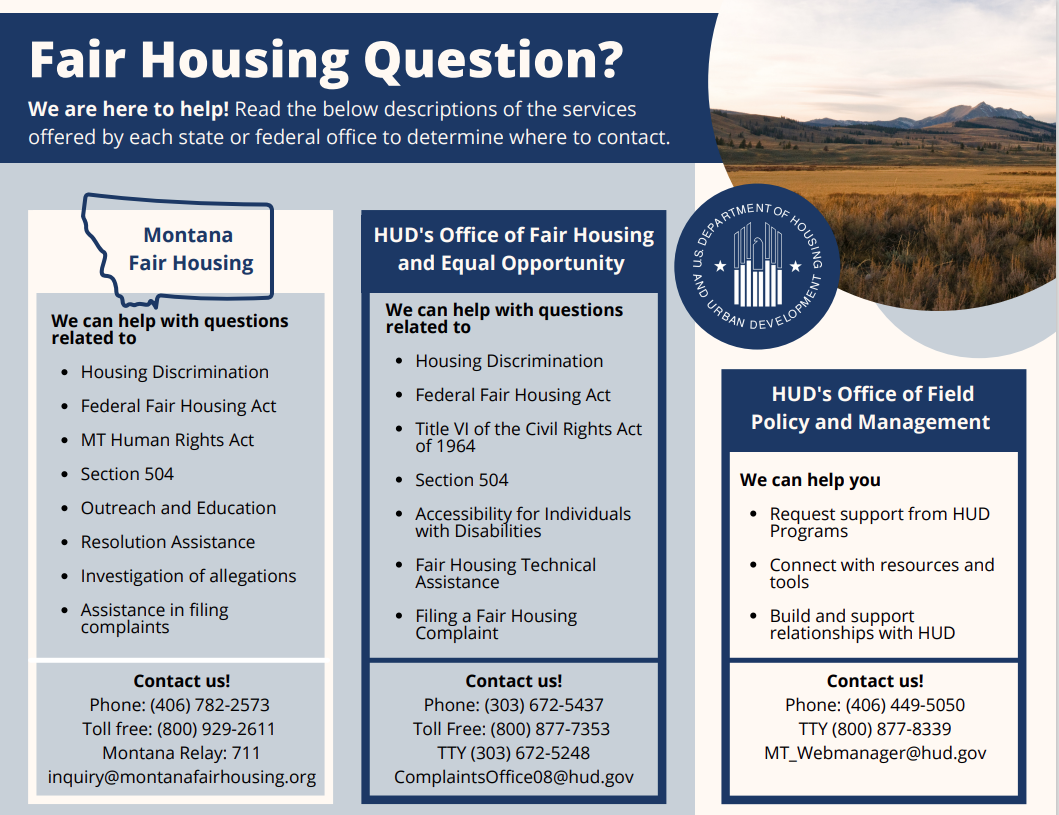Fair Housing
Federal and state fair housing laws prohibit discriminatory practices in any industry-related business or transaction that may affect the ability of protected class members to secure housing and/or live in the housing of their choice. These laws address discriminatory practices in the rental, sales, insurance, advertising, and mortgage and lending industries, as well as transactions that include the actions of Home Owner Associations and the enforcement of covenants. There are exemptions provided and under certain circumstances some protected class members may be excluded from particular housing sites.
Information about discrimination in housing
The federal Fair Housing Act as Amended in 1988 and the Montana Human Rights Act prohibit discrimination in housing based on someone’s protected class status.
The federally protected classes are:
- Race
- Color
- National Origin
- Religion
- Sex
- Familial Status (including children under the age of 18 in the household and pregnancy)
- Disability
In addition to the federal protected classes, the Montana Human Rights Act includes additional protected classes:
- Creed
- Marital Status
- Age
Both the federal and state fair housing acts prohibit retaliation against anyone who pursues his/her rights under the acts, or assists others in doing so.
Local jurisdictions may have non-discrimination ordinances that provide additional protections.
What Housing Is Covered?
The federal and state nondiscrimination laws cover most transactions related to the selling, purchasing or rental of housing. In some circumstances, the Acts exempt owner-occupied buildings with no more than four units (in Montana no more than two units), single-family housing sold or rented without the use of a broker, and housing operated by organizations and private clubs that limit occupancy to members.
What Is Prohibited?
In the Sale and Rental of Housing: No one may take any of the following actions based on race, color, national origin, religion, sex, familial status or disability, and in the state of Montana, additionally creed, age or marital status:
- Refuse to rent or sell housing
- Refuse to negotiate for housing
- Otherwise make housing unavailable
- Set different terms, conditions or privileges for sale or rental of a dwelling
- Provide different housing services or facilities
If You Think Your Rights Have Been Violated:
Call Montana Fair Housing. You have one year after an alleged violation to file a complaint with the Department of Housing and Urban Development, but you should contact Montana Fair Housing as soon as possible. A complaint must be filed with the Montana Human Rights Bureau within 180 days of the alleged violation.
What to Tell Montana Fair Housing:
- Your name and address
- The name and address of the person your complaint is against (the respondent)
- The address or other identification of the housing involved
- A short description of the alleged violation (the event that caused you to believe your rights were violated)
- The date(s) of the alleged violation
- The name of, and contact information for, any witnesses
Montana Fair Housing can:
- Investigate your complaint and potentially identify information to support your allegations.
- Assist you in filing a complaint of housing discrimination with the Department of Housing and Urban Development (HUD) and/or the Montana Human Rights Bureau (HRB).
- MFH can provide, under certain circumstances, dispute resolution services prior to the filing of a formal complaint of housing discrimination with HUD and/or the HRB.
What Happens After A Complaint Investigation?
If, after investigating your complaint, HUD and/or HRB find reasonable cause to believe that discrimination occurred, you will be informed of your right to request your case be heard in an administrative hearing, unless you or the respondent want the case to be heard in court.
You may file suit, at your expense, in Federal District Court or State Court within two years of an alleged violation. You may bring your suit even after filing a complaint with HUD and/or HRB, if you have not signed a conciliation agreement and an Administrative Law Judge has not started a hearing. A court may award actual and punitive damages and attorney’s fees and costs.
Montana Fair Housing
406-782-2573
1-800-929-2611
Montana Relay: 711
inquiry@montanafairhousing.org
Fair Housing Act as Amended in 1988
Montana Human Rights Act
1866 Civil Rights Act
